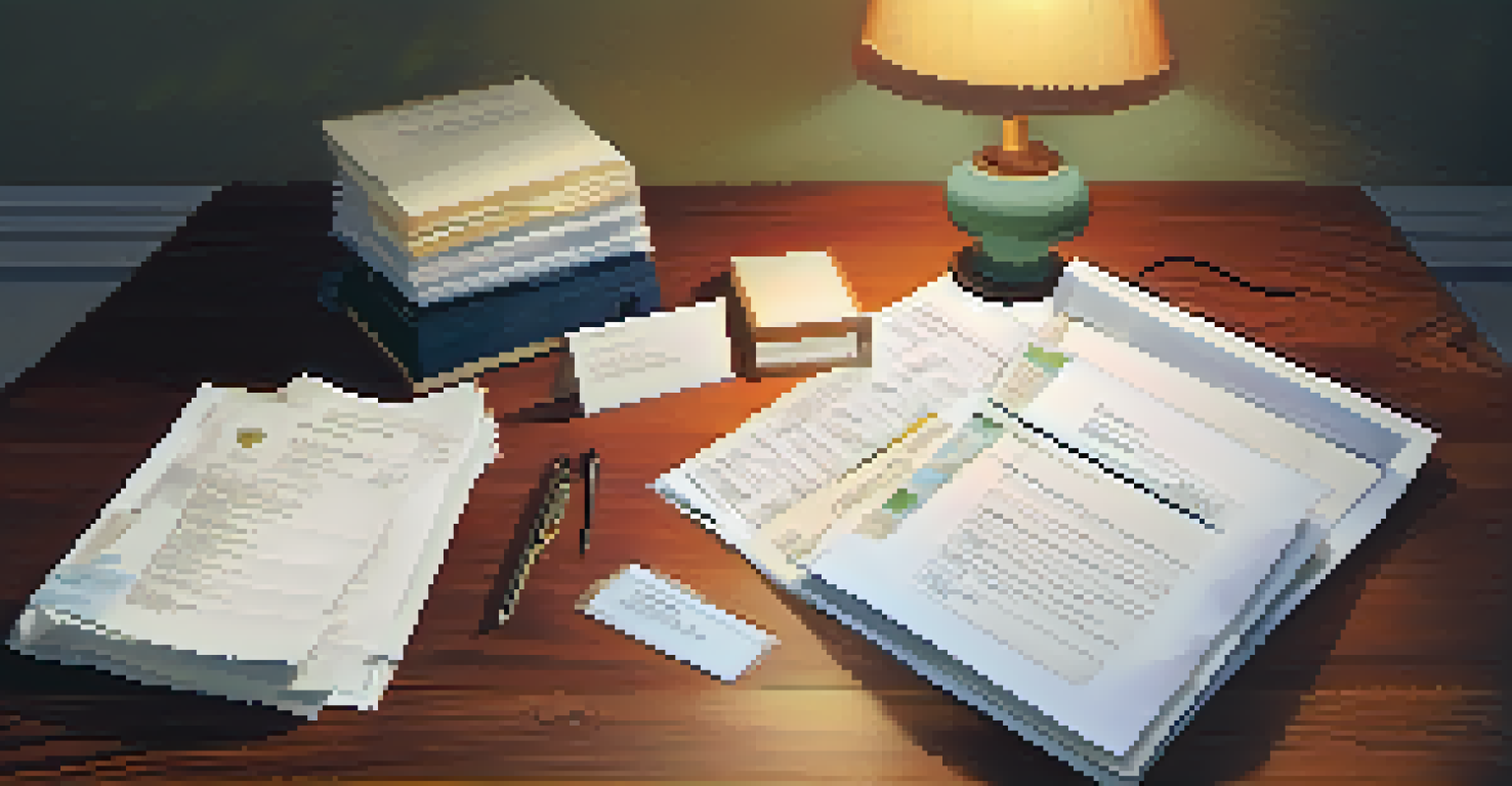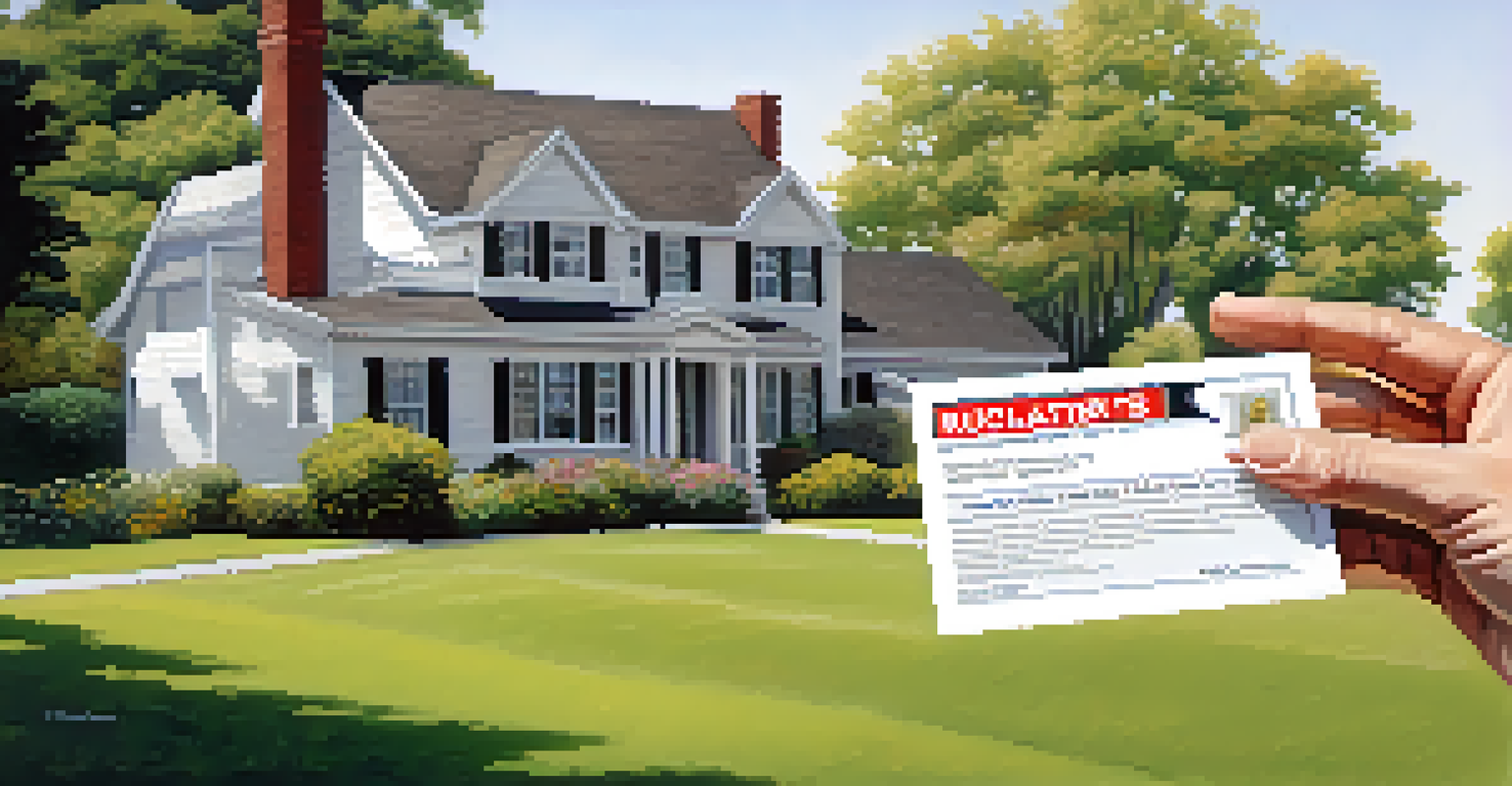How to Handle HOA Violations: A Homeowner's Guide

Understanding Your HOA's Rules and Regulations
Before you can address any HOA violations, it's crucial to understand the rules that govern your community. Homeowners' Associations have a set of guidelines that dictate everything from lawn maintenance to architectural changes. Familiarizing yourself with these regulations can help you identify whether a violation is real or a misunderstanding.
The art of communication is the language of leadership.
Take the time to review your HOA's bylaws and regulations, which are often available on their website or in a homeowner's handbook. Understanding the specifics of these rules can empower you to advocate for yourself effectively. If you’re unsure about any part of the regulations, don’t hesitate to reach out to your HOA for clarification.
Being well-informed not only prepares you to handle violations but also helps you maintain a positive relationship with your HOA. Knowledge is power, especially when navigating the often complex world of community living.
Common Types of HOA Violations Homeowners Encounter
HOA violations can range from minor infractions to more significant issues. Common violations include unkempt lawns, improper parking, and failing to adhere to exterior paint colors. Understanding these typical violations can help homeowners recognize potential issues before they escalate.

For instance, if you notice a neighbor's yard becoming overgrown, it could be a violation that the HOA needs to address. Similarly, if you've made a change to your home’s exterior without prior approval, that might be flagged by the HOA. Recognizing these common violations can save you from receiving unexpected notices.
Being aware of what constitutes a violation in your community allows you to stay proactive. It encourages not only compliance but also fosters a sense of community responsibility among homeowners.
Steps to Take When You Receive a Violation Notice
Receiving a violation notice can be alarming, but it's essential to remain calm and collected. Start by carefully reading the notice to understand the specific concerns raised by your HOA. Make note of any deadlines for compliance and the potential consequences of ignoring the issue.
Laws are like cobwebs, which may catch small flies, but let wasps and hornets break through.
Next, gather any evidence that may support your case. This could include photographs, previous correspondence with the HOA, or other documentation that clarifies your position. If you believe the violation is unwarranted, having this information handy can be incredibly beneficial.
Finally, reach out to your HOA to discuss the notice. Keeping the lines of communication open can often lead to a resolution that satisfies both parties. Remember, a collaborative approach can go a long way in maintaining a healthy relationship with your HOA.
Communicating Effectively with Your HOA
Effective communication is key when handling HOA violations. Start by addressing your concerns in writing, as this creates a documented record of your interactions. Be respectful and concise, outlining the specifics of your situation and any evidence you have gathered.
Consider requesting a meeting to discuss the violation in person. This can foster a better understanding and help build rapport between you and the HOA representatives. In-person discussions can often facilitate more productive conversations, allowing for immediate feedback and clarification.
Remember, your goal is to find a solution, not to create conflict. Approach the conversation with a positive attitude and a willingness to work together, and you’ll likely achieve a more favorable outcome.
Understanding the Appeal Process for Violations
If you believe a violation notice is unjust, most HOAs have an appeal process in place. This typically involves submitting a formal appeal to the board, where you can present your case. Understanding this process can provide you with an avenue to contest any discrepancies.
Before submitting an appeal, ensure you have all the necessary documentation and evidence to support your position. This might include photographs, witness statements, or previous agreements with the HOA. A well-prepared appeal increases your chances of a favorable outcome.
Once submitted, be patient and allow the HOA time to review your appeal. Remember, the board members are often homeowners themselves and may be sympathetic to your situation. Keeping the lines of communication open during this process is essential.
The Importance of Documentation in HOA Matters
In any dispute with your HOA, documentation is your best friend. Keeping a detailed record of all communication, notices, and any actions taken can serve as vital evidence in your favor. This can be particularly useful if a situation escalates to further disputes or legal action.
Create a folder—either physical or digital—where you store all relevant documents. Regularly update this folder with new correspondence or notices, making it easier to reference in the future. The more organized you are, the better prepared you’ll be to navigate any complexities that arise.
Having thorough documentation not only supports your claims but also demonstrates your commitment to resolving the issue. This can foster respect from your HOA and may lead to a more amicable resolution.
Navigating the Consequences of Ignoring Violations
Ignoring HOA violations can lead to significant consequences, including fines, legal action, or even foreclosure in extreme cases. Many homeowners underestimate the repercussions of non-compliance, often thinking they'll resolve issues later. However, procrastination can lead to a snowball effect that complicates matters.
If a violation goes unaddressed, the HOA may escalate their actions, which could involve additional fines or even legal proceedings. This can put a financial strain on homeowners and create unnecessary stress. It's essential to take any violation notice seriously and act promptly.

Addressing violations proactively not only helps maintain your property value but also fosters a harmonious community atmosphere. By being a responsible homeowner, you contribute positively to the neighborhood and encourage others to do the same.
Seeking Legal Advice When Necessary
In some cases, you may find that resolving an HOA violation requires legal intervention. If you believe that your rights are being violated or the HOA is acting outside of their authority, consulting a lawyer can be a wise step. Legal professionals can provide guidance tailored to your unique situation.
Before seeking legal advice, ensure you've exhausted all other options, such as communication and the appeals process. This shows that you’re reasonable and willing to resolve matters amicably. However, if those efforts fail, a lawyer can help protect your interests and navigate complex legalities.
Remember, seeking legal advice is not a sign of weakness; it’s a proactive way to protect your rights as a homeowner. With the right legal support, you can address violations effectively and ensure your voice is heard.